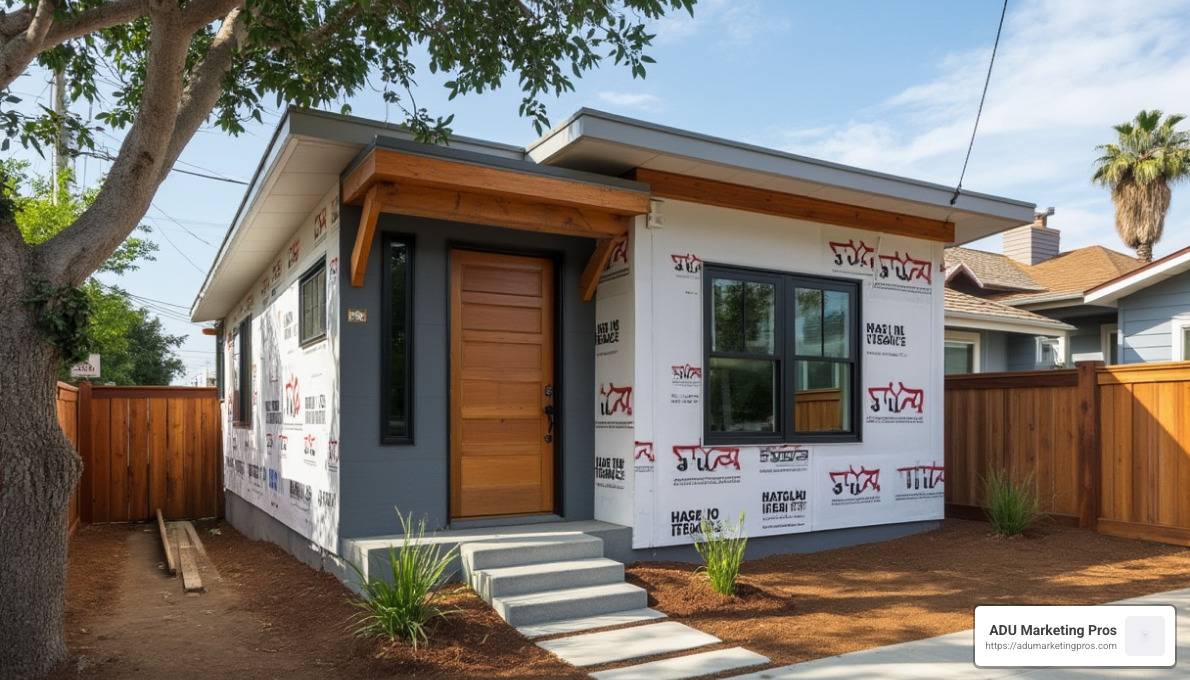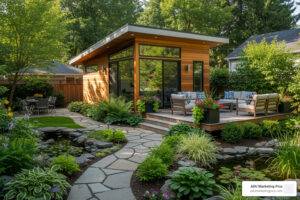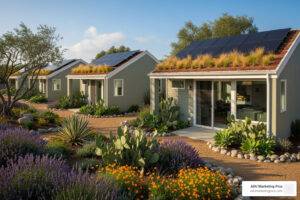Los Angeles ADU regulations have undergone significant changes, simplifying the process for homeowners to add Accessory Dwelling Units (ADUs) to their properties. Here’s a concise overview of the key points:
- Regulation Easing: New California State laws have reduced restrictions, enabling a wider variety of ADU types and sizes.
- Construction Scope: Homeowners have the option to construct new units or convert existing spaces like garages.
- Zoning and Size: ADUs are allowed on most residentially zoned lots, with permissible sizes up to 1,200 square feet.
- Benefits: ADUs offer flexible solutions such as rental income, housing for family members, or extra living space.
ADUs, or Accessory Dwelling Units, are becoming a vital part of housing solutions in California. These units provide substantial benefits, including additional rental income, increased property value, and essential accommodation options for family members. Thanks to forward-thinking state legislation, building an ADU in Los Angeles is now more feasible than ever.
California’s regulatory updates have made it easier for homeowners, providing more flexibility in the construction and use of ADUs. With the ability to either build new or convert existing spaces like garages, the customization potential for these units is extensive. Whether you’re adding a simple “granny flat” or a modern guest house, these regulations encourage innovation in home design and efficient use of space.

Understanding Los Angeles ADU Regulations
Navigating the Los Angeles ADU regulations can feel like a maze, but understanding the key requirements and permit process can simplify your journey. Here’s a breakdown of what you need to know:
Key Requirements
Zoning and Building Codes
In Los Angeles, ADUs can be built on most residentially zoned lots. The city has streamlined the process to encourage more homeowners to build these units.
-
Setbacks: The minimum setback requirements are 4 feet from the side and rear property lines. This ensures the ADU fits comfortably within the property while respecting neighboring spaces.
-
Maximum Height: ADUs can be up to 16 feet tall. This height limit allows for flexibility in design, whether you’re building a single-story unit or considering a loft-style space.
-
Minimum Size: The smallest ADU you can build is 150 square feet. This size can accommodate a compact studio with essential amenities.
Permit Process
The permit process for ADUs in Los Angeles involves several steps, but it’s designed to be straightforward if you follow the guidelines:
-
ZIMAS: Start by using the Zone Information and Map Access System (ZIMAS) to verify your property’s zoning and any specific regulations that may apply.
-
LADBS: The Los Angeles Department of Building and Safety (LADBS) is your go-to for plan submittal. You’ll need to prepare a comprehensive package, including plot plans, floor plans, and energy compliance documents.
-
Plan Submittal: Submit your plans through ePlanLA or visit a Development Service Center. Once submitted, your plans will be reviewed for compliance with zoning and building codes. You’ll receive a correction list if any adjustments are needed.
-
Clearances: Depending on your location, you may need additional clearances from other city departments, like the Department of Water and Power or the Fire Department.
Once all requirements are met and clearances obtained, your permit will be issued, and you can begin construction. That any deviations from the approved plans require re-approval, so it’s crucial to stick to the submitted design.
Building an ADU in Los Angeles is a fantastic opportunity to improve your property. With clear guidelines and a streamlined permit process, you can confidently steer the regulations and start your ADU project.

Next, we’ll explore the different types of ADUs you can consider for your property, helping you choose the best fit for your needs.
Types of ADUs in Los Angeles
When considering the addition of an Accessory Dwelling Unit (ADU) to your property in Los Angeles, it’s important to understand the different types available. Each type has its unique features and benefits, catering to various needs and preferences.
Detached ADUs
Detached ADUs are standalone structures that are separate from the main house. These units offer the highest level of privacy since they don’t share any walls with the primary residence. They can be built in the backyard or another part of the property, making them ideal for those who want to create a completely independent living space.
Attached ADUs
Attached ADUs involve expanding the existing main home. This type of ADU shares at least one wall with the primary residence and often provides a more seamless integration with the existing home design. They are a good option if you want to add extra space without occupying additional yard space.
Conversion ADUs
Conversion ADUs are created by changing an existing part of the home or an accessory structure, like a garage, into a living unit. This option is often more cost-effective since it uses the existing footprint of the property. It’s a popular choice for homeowners looking to maximize the use of their current structures.
Junior ADUs (JADUs)
Junior ADUs (JADUs) are a unique type of ADU, limited to a maximum size of 500 square feet. These units are typically part of the main home, often utilizing space like a master bedroom or a large living area. JADUs must include an efficiency kitchen, which is equipped with basic cooking facilities. They may share a bathroom with the main house, which can help reduce construction costs.

Understanding these different types of ADUs can help you decide which option best suits your property and lifestyle needs. Whether you choose a detached unit for its privacy, an attached unit for its seamless integration, a conversion for its cost-effectiveness, or a JADU for its compact efficiency, each type offers unique advantages.
In the next section, we’ll dig into the benefits of building an ADU, exploring how they can improve your property value and provide additional income opportunities.
Benefits of Building an ADU
Building an Accessory Dwelling Unit (ADU) in Los Angeles comes with a host of benefits that can make a significant impact on your property and lifestyle.
Rental Income
One of the most enticing benefits of constructing an ADU is the potential for rental income. Renting out your ADU can provide a steady cash flow, helping to offset your mortgage or other expenses. The rental income you can generate depends on factors like location, size, and amenities. For instance, an ADU rented for $1,000 per month could increase your property’s value by approximately $100,000. This is a substantial financial boost, making ADUs an attractive investment for homeowners.
Increase in Property Value
Adding an ADU to your property can significantly increase its value. As per the research, your property’s value could rise by roughly 100 times the monthly rental value of the ADU. This means that not only do you benefit from immediate rental income, but you also gain long-term appreciation in your property’s market value. This makes ADUs a smart choice for homeowners looking to improve their real estate investment.
Housing for Family
ADUs offer a flexible housing solution for families. They can serve as a home for adult children returning from college, a comfortable space for elderly parents, or a convenient place for a caregiver. This proximity allows families to stay close while maintaining privacy and independence. Plus, having family nearby can be both emotionally rewarding and practically beneficial, especially if you need help with childcare or eldercare.
In summary, building an ADU in Los Angeles not only provides financial benefits through rental income and increased property value but also offers practical solutions for housing family members. Whether you’re looking to generate extra income, boost your property’s worth, or accommodate loved ones, an ADU can be a valuable addition to your property.
Frequently Asked Questions about Los Angeles ADU Regulations
What are the restrictions for an ADU in Los Angeles?
When it comes to Los Angeles ADU regulations, there are some key restrictions to keep in mind.
Vehicular Access and Setback Requirements
First, let’s talk about vehicular access. Generally, conversion ADUs and junior ADUs don’t require additional parking. However, attached and detached ADUs usually need one parking space unless specific exemptions apply. It’s crucial to check if your project qualifies for these exemptions.
Next, setback requirements are important for both attached and detached ADUs. In Los Angeles, these units need to be at least 4 feet away from side and rear property lines. This ensures safety and compliance with fire codes. Conversion ADUs and junior ADUs must also maintain a safe distance for fire safety but usually have more flexible setback rules.
Can you build a 2-story ADU in Los Angeles?
Yes, you can build a two-story ADU in Los Angeles. The city’s regulations allow for such constructions, offering more flexibility for homeowners with limited space. This is especially beneficial for maximizing living space on smaller lots.
Two-story ADUs must comply with the maximum height restriction, generally set at 16 feet. However, specific circumstances might allow for greater height, so it’s wise to consult with the Los Angeles Department of Building and Safety (LADBS) for precise guidelines.
These units provide independent living facilities, making them ideal for rental or family use. With separate entrances and complete living amenities, they offer privacy and functionality.
Are ADUs under rent control in Los Angeles?
Detached ADUs in Los Angeles are generally not subject to the city’s rent stabilization ordinance. This means you have more flexibility in setting rental rates compared to traditional rental properties under rent control.
However, remain informed about any changes in local regulations. While detached ADUs enjoy this exemption, other types of units might face different rules. Always check the latest guidelines to ensure compliance and make the most of your ADU investment.
Conclusion
Building an ADU in Los Angeles is not just about adding space; it’s about creating opportunities. Whether you’re looking to boost your property’s value, generate rental income, or provide housing for family members, understanding the Los Angeles ADU regulations is crucial.
Here at ADU Marketing Pros, we specialize in helping ADU construction and architecture firms stand out in this competitive market. Our focus is on delivering specialized marketing solutions that highlight your expertise rather than competing on price alone.
Our custom strategies, like targeted SEO, PPC, and social media campaigns, ensure your firm captures high-quality leads. We understand the unique challenges faced by ADU businesses, and we’re here to help you steer them effectively.
Ready to lift your ADU business? Find our specialized marketing solutions today.
By partnering with us, you’re choosing a team dedicated to driving measurable growth for your business while building a strong, recognizable brand identity in the ADU sector. Let’s turn your expertise into success!




